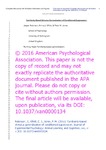Familiarity-Based Stimulus Generalization of Conditioned Suppression
| dc.contributor.author | Robinson, J | |
| dc.contributor.author | Whitt, EJ | |
| dc.contributor.author | Jones, Peter | |
| dc.date.accessioned | 2017-01-16T16:38:10Z | |
| dc.date.available | 2017-01-16T16:38:10Z | |
| dc.date.issued | 2017-03-01 | |
| dc.identifier.issn | 2329-8456 | |
| dc.identifier.issn | 2329-8464 | |
| dc.identifier.uri | http://hdl.handle.net/10026.1/8247 | |
| dc.description.abstract |
We report that stimulus novelty/familiarity is able to modulate stimulus generalization and discuss the theoretical implications of novelty/familiarity coding. Rats in Skinner boxes received clicker → shock pairings before generalization testing to a tone. Before clicker training, different groups of rats received preexposure treatments designed to systematically modulate the clicker and the tone's novelty and familiarity. Rats whose preexposure matched novelty/familiarity (i.e., either both or neither clicker and tone were preexposed) showed enhanced suppression to the tone relative to rats whose preexposure mixed novelty/familiarity (i.e., only clicker or tone was preexposed). This was not the result of sensory preconditioning to clicker and tone. (PsycINFO Database Record | |
| dc.format.extent | 159-170 | |
| dc.format.medium | ||
| dc.language | en | |
| dc.language.iso | en | |
| dc.publisher | American Psychological Association (APA) | |
| dc.subject | novelty | |
| dc.subject | familiarity | |
| dc.subject | recognition memory | |
| dc.title | Familiarity-Based Stimulus Generalization of Conditioned Suppression | |
| dc.type | journal-article | |
| dc.type | Journal Article | |
| plymouth.author-url | https://www.webofscience.com/api/gateway?GWVersion=2&SrcApp=PARTNER_APP&SrcAuth=LinksAMR&KeyUT=WOS:000399095200004&DestLinkType=FullRecord&DestApp=ALL_WOS&UsrCustomerID=11bb513d99f797142bcfeffcc58ea008 | |
| plymouth.issue | 2 | |
| plymouth.volume | 43 | |
| plymouth.publication-status | Published online | |
| plymouth.journal | Journal of Experimental Psychology: Animal Learning and Cognition | |
| dc.identifier.doi | 10.1037/xan0000134 | |
| plymouth.organisational-group | /Plymouth | |
| plymouth.organisational-group | /Plymouth/Faculty of Health | |
| plymouth.organisational-group | /Plymouth/Faculty of Health/School of Psychology | |
| plymouth.organisational-group | /Plymouth/REF 2021 Researchers by UoA | |
| plymouth.organisational-group | /Plymouth/REF 2021 Researchers by UoA/UoA04 Psychology, Psychiatry and Neuroscience | |
| plymouth.organisational-group | /Plymouth/Users by role | |
| plymouth.organisational-group | /Plymouth/Users by role/Academics | |
| dc.publisher.place | United States | |
| dcterms.dateAccepted | 2016-12-16 | |
| dc.identifier.eissn | 2329-8464 | |
| dc.rights.embargoperiod | No embargo | |
| rioxxterms.versionofrecord | 10.1037/xan0000134 | |
| rioxxterms.licenseref.uri | http://www.rioxx.net/licenses/all-rights-reserved | |
| rioxxterms.licenseref.startdate | 2017-03-01 | |
| rioxxterms.type | Journal Article/Review |


